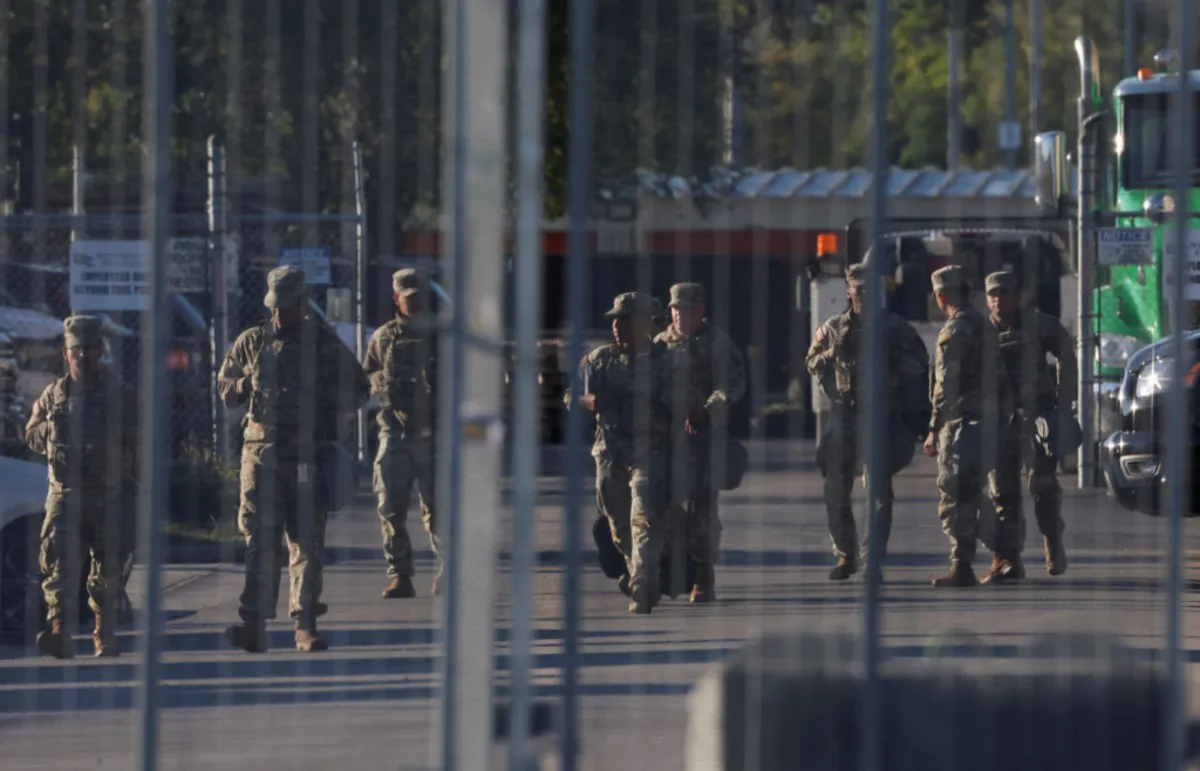
Members of the National Guard, recently ordered to deploy to Illinois by President Donald Trump, are now stationed to protect federal property near Chicago. This deployment comes ahead of an important court hearing scheduled for Thursday regarding the legality of their presence in the state. According to a spokesperson from the U.S. Northern Command, 200 troops from the Texas National Guard arrived in the Chicago area on Wednesday. The spokesperson, wishing to remain anonymous, shared operational details that have not been publicly disclosed.
In the meantime, a significant legal challenge is underway as two dozen states led by Democratic officials have joined forces to contest the deployment of the National Guard in Portland, Oregon. U.S. District Judge April Perry is set to hear arguments regarding a request to block the deployment of both Illinois and Texas Guard members in Illinois. The city of Chicago and the state of Illinois filed a lawsuit on Monday, deeming the presence of these troops as unnecessary and illegal. President Trump has characterized Chicago as a “lawless hellhole,” despite recent statistics indicating a notable decline in crime rates.
The legal filing from Chicago and Illinois emphasizes that protests at a temporary ICE detention facility in the suburb of Broadview have “never come close to stopping federal immigration enforcement.” This assertion highlights the ongoing tensions surrounding immigration and law enforcement in the region.
In a show of solidarity, all twenty-four states with a Democratic attorney general or governor have signed onto a court filing supporting California and Oregon’s legal challenge against the National Guard's deployment in Portland. The filing, submitted to the U.S. 9th Circuit Court of Appeals, argues that the President is undermining the rule of law by deploying troops in the absence of an actual threat, such as an invasion or rebellion. This action, they claim, sets a dangerous precedent that jeopardizes the constitutional rights of all Americans.
On Thursday, the federal court will consider the government’s appeal to overturn a previous ruling that blocked the Guard’s deployment in Portland. President Trump has described the ongoing protests at an immigration processing facility in Portland as a “war zone,” underscoring the administration's stance on the necessity of military presence in urban areas facing unrest. However, troops have yet to be deployed in Portland.
Seattle Mayor Bruce Harrell recently signed an executive order reaffirming the independence of the city's police department and committing to a system for reporting alleged abuses by federal agents and soldiers. This move reflects the growing concerns about civil rights during times of heightened law enforcement presence.
The initial batch of Texas Guard troops, dispatched to Chicago by President Trump, arrived at an Army training center just outside the city on Tuesday. Reports indicated that military personnel were seen in uniforms featuring the Texas National Guard patch at the U.S. Army Reserve Center in Elwood, located approximately 55 miles southwest of Chicago. Governor JB Pritzker of Illinois has stated that around 300 of the state's National Guard members have been federalized and are being deployed to the city, alongside 400 troops from Texas. Pritzker has openly criticized Trump’s plan, labeling it as “unlawful and dangerous.”
President Trump argues that the deployment of troops is essential to safeguard federal immigration enforcement efforts and combat crime. Since the beginning of his second term, he has either sent or considered sending troops to ten different cities, including Portland, Oregon; Baltimore; Memphis, Tennessee; Washington D.C.; New Orleans; and several California cities such as Oakland, San Francisco, and Los Angeles. However, the exact details and timing of the National Guard's activities in Memphis remain unclear.
The American Civil Liberties Union (ACLU) of Illinois has filed a lawsuit against President Trump and the U.S. Department of Homeland Security. The lawsuit claims that U.S. Immigration and Customs Enforcement (ICE) has launched a campaign of violence and intimidation against peaceful protesters and journalists at the Broadview, Illinois, facility. Reports indicate that federal agents have repeatedly used tear gas and other projectiles against crowds, raising alarms about civil liberties and the treatment of demonstrators.
As the situation evolves, it remains crucial to monitor these deployments and their implications for civil rights, law enforcement, and public safety across the United States.